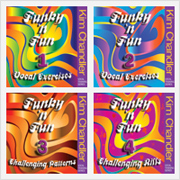Choosing the right singing teacher can be a veritable minefield! Due to the fact that it’s largely an unregulated profession, it is an unfortunate state of affairs that anyone can set up as a vocal coach or singing teacher whether they have the skills, training, expertise and experience, or not. There are some excellent teachers out there, but conversely there are also horror stories (mercifully few) concerning the ones to avoid. As the paying client, you’ve got a lot to check out before you hand your one & only voice over to just anybody. You need to know that your hard-earned money is being put to good use and that your voice is in the right hands for your needs.
There are three categories of vocal coaches as regards their level of effectiveness:
-
Those who are effective and achieve quick, positive, lasting results (the most desirable category)
-
Those where the progress may be slow (if it happens at all), but at least these teachers are not a hazard or risk to your vocal health
-
Those few whose techniques, methods, advice or instructions inadvertently have the potential to lead to vocal problems and even injury. (the least desirable category)
Ideally, you want to be with a coach in the first category, so I’ve outlined a checklist of 12 key areas for you to discuss with a prospective teacher in order to better inform your choice:
-
Musical Training: Ask whether they have any recognised music qualification(s), e.g. PhD, Masters Degree, Bachelor Degree, Diploma etc from reputable institutions. The higher the qualification the better. Ask to see the certificates themselves if you need reassurance. They should have no qualms doing this for you.
-
Performing Experience: Ask about their performing background and experience. Does it match in style with what you are wanting to work on? Was it only in the past or are they still a performer now? Do you like their singing voice? Will they be the right vocal role model for you?
-
Vocal Training: Ask about the extent of their own vocal training history. Which type(s) of singing did they train in? Make sure this matches your own style. Do they have specific vocal training qualification(s)? Which particular methodology(ies) are they trained in or at least familiar with?
-
Teacher Training: Ask whether they have any recognised teacher training qualification(s). This will help ensure that they know about how to structure and pace a lesson, how to put together an overall plan of vocal development, how to cater for different learning styles, how to communicate effectively etc.
-
Ongoing Training: Ask whether they are committed to ongoing training and lifelong learning? Do they regularly attend master classes, workshops, voice conferences etc in order to update their knowledge base & approach? Do they stay abreast of the latest findings in vocal research that pertains to teaching singing?
-
Teaching Experience: Ask about the extent of their teaching experience. How long have they taught privately? What abilities level(s) do they teach? Have they taught at any reputable institutions? If yes, in what capacity? Have they led any vocal master classes or workshops?
-
Associations & Memberships: Ask whether they belong to any recognised vocal associations (e.g. the BVA, AOTOS etc here in the UK). Whilst membership is no guarantee of quality, these associations are excellent places for professional contact, development, training and healthy peer discussion & debate.
-
Location: This is a crucial area to consider because generally if you have to travel too far, even with the best of intentions, it can become unsustainable in the longer term. If distance is an issue, are they set up with online options (e.g. Skype, FaceTime, etc.) as an alternative?
-
Facilities: Ask what teaching facilities they have, e.g. is the room a suitable size? Does it have the requisite equipment, e.g. a keyboard, audio file playing facilities, the ability to record the lessons etc? Is it well ventilated, clean? Do you feel comfortable there, etc?
-
Teaching rates: This should be a true reflection of the market rate, taking into consideration of all of the above, but sometimes isn’t. Too cheap and you’ll generally be getting what you pay for. Conversely, beware of coaches requiring lots of lessons paid in advance and/or charging excessive fees. Expensive isn’t always a guarantee of quality or value for money!
-
Reputation: This is an indication of a teacher’s quality, results and general reliability. Ask around people you trust about singing teachers they would recommend to you.
-
Results: This area is the bottom line. You should see incremental improvement straight away and if you don’t, then question staying on with that person – they may not be the right match for you.
I trust that this advice helps you find the right teacher for your needs. Be wise 🙂

